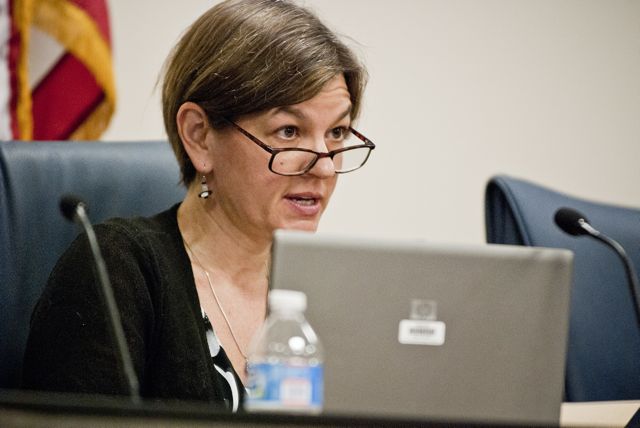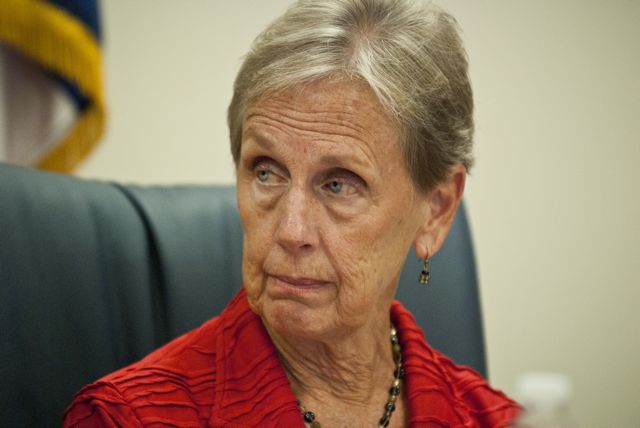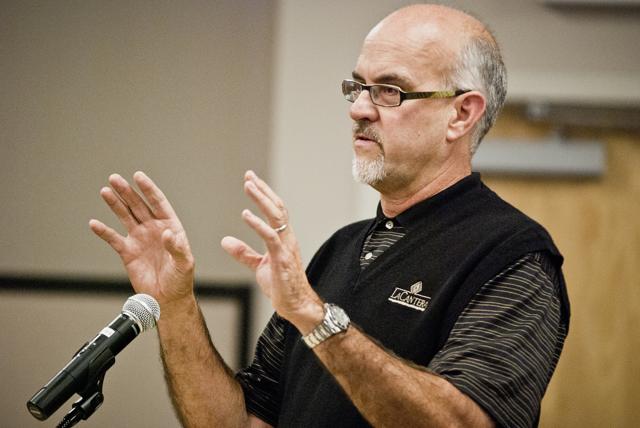After months of rancor over Buncombe County’s personnel ordinance, the Board of Commissioners gave final approval Aug. 21 to a revised version that doesn’t specifically ban discrimination based on sexual orientation or gender identity.
 Commissioner Holly Jones had broached the topic during the board’s annual retreat in January. But things didn’t come to a head until County Manager Wanda Greene put the revised ordinance on the board’s Aug. 7 meeting agenda. (photos by Max Cooper)
Commissioner Holly Jones had broached the topic during the board’s annual retreat in January. But things didn’t come to a head until County Manager Wanda Greene put the revised ordinance on the board’s Aug. 7 meeting agenda. (photos by Max Cooper)
Despite prior opposition by Greene and Human Resources staff, the ordinance included changes to longevity pay that Jones had advocated. But the lack of LGBT protections immediately emerged as a major sticking point. And though Jones’ attempts to add them failed and the ordinance was approved 4-1, the conflict appeared to set the stage for a heated debate over equality and transparency issues in the run-up to the fall election.
Behind closed doors
During the Aug. 7 public hearing, county residents overwhelmingly urged the commissioners to add sexual orientation and gender identity to its list of legally protected classes. Some county employees said it would help them feel more secure in their jobs.
But only board Chair David Gantt supported Jones’ proposed amendment adding those categories.
Vice Chair Bill Stanley insisted that there is no discrimination against LGBT employees. And neither K. Ray Bailey nor Carol Peterson offered much explanation for their votes against the amendment, leaving ample room for later speculation concerning what had been discussed during the closed session that immediately preceded the vote.
Some prominent observers even questioned whether the commissioners had violated North Carolina law, which states, "General personnel policy issues may not be considered in a closed session.’
The Asheville Citizen-Times subsequently ran commentaries by both Karen Oelschlaeger, president of the League of Women Voters of Asheville-Buncombe County, and Jim Aycock, former publisher of the Black Mountain News, that cited the statute. Talk-show host Pete Kaliner of WWNC News Radio also mentioned it during several broadcasts, slamming the commissioners for what he saw as questionable behavior.
Was it legal?
But a review by N.C. Press Association attorney Amanda Martin, and the Aug. 16 release of the closed session’s minutes, appear to leave the commissioners on solid legal ground.
According to Martin, state law permits commissioners to seek legal advice behind closed doors about amending their personnel ordinance. "If they were getting legal advice about potential liability if they did or didn’t include that provision, then the lawyer could give that advice," she maintained, cautioning that any closed-session deliberations must be strictly limited to legal advice.
Associate County Attorney Curt Euler, who filled in for County Attorney Michael Frue at the Aug. 7 meeting, agrees. ‘They couldn’t go back there and talk about whether homosexuality is good or bad. That has nothing to do with the legal ramifications,’ he notes.
The sole record of what was discussed in that closed session is the minutes produced by Clerk to the Board Kathy Hughes, who’s also the county’s public relations director.
But Hughes’ account, which the commissioners unanimously approved, is short on details. "The Board heard from the County Attorney regarding the legal implications of including sexual orientation in the County’s Personnel Ordinance. No action was taken," it states.
That left some observers frustrated. "If, during closed session, the commissioners moved beyond legal technicalities, then the commissioners violated the law," Oelschlaeger wrote in an Aug. 16 statement. "Though the minutes do not indicate any such illegal discussions, I am not confident that the minutes meet the legal standard of ‘full and accurate.’" She’s been urging the commissioners to update the policy for more than a year.
A civil rights issue?
Meanwhile, in an Aug. 20 email newsletter, Jones skewered her colleagues who’d voted against the amendment. "The majority of Buncombe County commissioners gave the nod to the threat of hypothetical and fanciful lawsuits, thus determining civil rights to be unimportant," wrote Jones.
 According to the Citizen-Times, both Stanley and Peterson had concerns about the amendment’s potential legal ramifications. Peterson cited possible conflicts with Amendment One, the gay marriage ban North Carolina voters approved in May.
According to the Citizen-Times, both Stanley and Peterson had concerns about the amendment’s potential legal ramifications. Peterson cited possible conflicts with Amendment One, the gay marriage ban North Carolina voters approved in May.
Jones also cited an Aug. 20 Citizen-Times article quoting legal expert Maxine Eichner, who said she was "baffled" by the commissioners’ explanations. ‘‘Amendment One does not speak to this,’ Eichner told the paper, which went on to say that it ‘is no bar to adoption of a nondiscrimination clause.’
"Of the 15 N.C. counties and cities that offer these protections in their nondiscrimination policies, none have faced significant, if any, legal challenge," added Jones.
She also faulted her colleagues for going into closed session, even though she was part of that unanimous decision.
"To add insult to injury,’ the newsletter continued, ‘this personnel policy matter was discussed outside of the public’s rightful view, thus giving some members of the public the impression that there was some sort of important information shared that justified discrimination. No such concrete information was shared. Hypothetical lawsuits and vague references to Amendment One’s passage were discussed, nothing having specifics to warrant serious legal concerns."
Vote unchanged
At the Aug. 21 meeting, Jones called on her colleagues to change the procedural rules to allow another vote on her amendment, hoping some of them might have had their minds changed by the subsequent legal information and public feedback.
But while Gantt said he supported the proposed protections, he sided with the majority in rejecting her motion to change the procedural rules, which died for lack of a second.
In another move that could raise eyebrows among open-government advocates, Gantt said he’d talked to each of the commissioners before the meeting and had determined that an additional vote on the amendment would have yielded the same outcome.
Due to procedural rules, a second vote on the whole ordinance was required. Stanley, who was recovering from congestive heart failure, cast his vote via speakerphone.
In protest, Jones once again cast the lone vote against the entire ordinance. "I do believe that it’s important – if we’re going to be an anchor institution in this community, if we are going to reflect our community – to send a strong message about our intolerance of discrimination and include it specifically in our ordinance," she explained.
Peterson, however, maintained that the policy doesn’t "leave our GLBT employees unprotected. It is disingenuous and flat out wrong to continue to say that there are no protections. These comments instill fear unnecessarily and distort what the current working conditions are,’ she declared.
Peterson cited no specifics to back up her claim, and Human Resource Manager Lisa Eby, who wrote up the revisions, declined to be interviewed. The ordinance does state that "Buncombe County is committed to a work environment that is free from harassment and discrimination" and that "Harassment of employees by Supervisors or co-workers is forbidden in any form."
Elsewhere, however, legal protection against "unlawful workplace harassment" and assurances of "equal employment opportunity" are very specifically defined for 11 categories – but not for sexual orientation or gender identity.
And an analysis on the county’s policy released by the Campaign for Southern Equality, an Asheville-based nonprofit, asserts, "Under current law, an individual can be fired for being lesbian, gay, bisexual [or] transgender." Nationwide, the report continues, "LGBT people experience high rates of discrimination and harassment in the workplace, with 37 percent of LGBT and 90 percent of transgender people reporting such experiences."
Looking toward November
The day after the final vote, Jones posted a message on her Facebook page urging residents to vote for commissioner candidates who support amending the nondiscrimination policy.
"A new generation is coming, one who understands the relevance of this specific protection and can think for themselves," Jones proclaimed, citing Democrats Brownie Newman, Ellen Frost and Terry Van Duyn as candidates "who are not afraid to stand up for our LGBT employees."
But the issue isn’t necessarily falling along party lines. Peterson is also a Democrat, and Republican candidates David King and Don Guge recently told Xpress that they would have supported Jones’ amendment.
Meanwhile, Democrat Michelle Pace Wood and Republicans Mike Fryar and Joe Belcher all said they would have opposed it.
 Belcher received the most votes of any Republican candidate in the District 3 primary. And during the public hearing, he insisted that adding the disputed categories isn’t necessary.
Belcher received the most votes of any Republican candidate in the District 3 primary. And during the public hearing, he insisted that adding the disputed categories isn’t necessary.
"Some things are common sense. … You treat everyone as they should be treated. There is but one law, and that, I believe, is the word of God," Belcher declared. "I’m part of a discriminated class in this country: Christian people. It bothers me, but … I don’t need someone to go and write a law to protect me."
What Belcher didn’t acknowledge, however, is that the ordinance specifically protects religion from discrimination, along with race, color, sex, national origin, political affiliation, physical or mental disability, age, veteran status and genetic information.
"Those classes," noted Jasmine Beach-Ferrara, executive director of the Campaign for Southern Equality, "are meant to protect groups vulnerable to discrimination."
Jake Frankel can be reached at 251-1333, ext. 115, or at jfrankel@mountainx.com.



Before you comment
The comments section is here to provide a platform for civil dialogue on the issues we face together as a local community. Xpress is committed to offering this platform for all voices, but when the tone of the discussion gets nasty or strays off topic, we believe many people choose not to participate. Xpress editors are determined to moderate comments to ensure a constructive interchange is maintained. All comments judged not to be in keeping with the spirit of civil discourse will be removed and repeat violators will be banned. See here for our terms of service. Thank you for being part of this effort to promote respectful discussion.